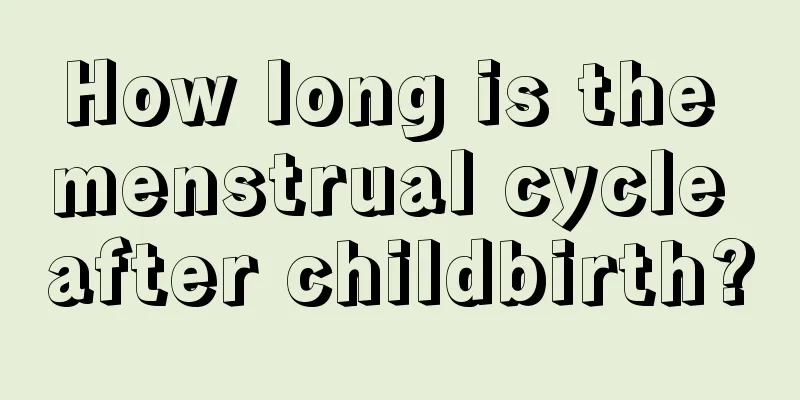How long is the menstrual cycle after childbirth?

|
A woman's menstruation will stop after pregnancy, but most people don't know how long it will take to recover after delivery. The menstrual cycle after delivery is very tricky, because the physical condition of each mother is different, so for different people it still needs to be determined based on the actual situation. Next we will introduce you in detail about the time issue of the postpartum menstrual cycle. The time of resumption of menstruation after childbirth varies. Some women may have menstruation as early as one month after delivery, while others may not resume until the baby is one year old. From a medical point of view, based on the tissue morphology of the endometrium, the ovaries may be able to ovulate as early as 33-42 days after delivery. In addition, the presence of a corpus luteum after ovulation can also be observed 6 weeks after delivery. Therefore, if the mother does not breastfeed, menstruation will usually come within 6 to 8 weeks after delivery. Research data show that 40% of mothers who do not breastfeed will resume ovulation 6 weeks after delivery; by 8-12 weeks after delivery, only about 35% of mothers have not resumed ovulation and menstruation. About 25% of breastfeeding mothers will resume ovulation and menstruation 12 weeks after delivery, and most breastfeeding mothers usually take 18 weeks to fully resume ovulation function. However, it is sometimes difficult to clinically determine the exact time of the first menstruation after delivery, and a few mothers will begin to have small to moderate intermittent bleeding immediately after delivery. Menstruation of breastfeeding mothers For new mothers who breastfeed their babies, ovulation and menstruation resume later, and some may not have their menstruation until a year later. For most people, their first menstrual period is heavier than usual, but their second period becomes normal, so no treatment is needed. When menstruation comes, the amount of milk a breastfeeding mother produces generally decreases, and the quality of the protein and fat in the breast milk also changes slightly, with the protein content being higher and the fat content being lower. This milk sometimes causes indigestion symptoms in babies, but this is a temporary phenomenon and will return to normal after the menstrual period. Therefore, mothers do not need to stop breastfeeding whether during or after menstruation. The above content is an introduction to the timing of the postpartum menstrual cycle. In fact, if the menstruation does not resume within a short period of time after giving birth, the mother should not be too anxious. This is a very normal phenomenon. However, if the menstruation is irregular for a long time, a detailed examination is needed. Postpartum care is also very critical. |
<<: Factors that cause two periods in one month
>>: What to do if you have high blood pressure in a pregnant woman
Recommend
How to prevent uterine contractions in the sixth month of pregnancy
Uterine contractions refer to uterine contraction...
The urine of a 26-year-old programmer actually attracted a group of ants! When the body sends these signals, you should be careful
Recently, such a piece of news has attracted peop...
How long does it take for a caesarean section incision to heal?
Being able to give birth to a baby healthily is v...
Can I drive during pregnancy? When is the best time to drive during pregnancy?
We all know that after a woman becomes pregnant, ...
I saw blood again ten days after my period ended.
Most women think that bleeding during non-menstru...
Does eating fried dough sticks have any effect on the fetus if pregnant women
Although pregnant women should pay special attent...
How to protect the tire best
During the process of pregnancy, there are always...
These are the symptoms of Yin deficiency in women!
Once female friends develop symptoms of Yin defic...
What is the best contraceptive method for women after abortion?
Abortion is not only harmful to the body, but als...
How to make your breasts smaller
In our lives, many people do breast augmentation ...
What to eat during breastfeeding to clear away heat and relieve fire
Breastfeeding mothers are prone to getting angry,...
How to take Calcium Carbonate D3 Tablets for Pregnant Women
The use of medicines by pregnant women is a proce...
What to do if breast hyperplasia occurs during lactation
The breast is a very important reproductive organ...
Effect of drinking black chicken soup on miscarriage
Black chicken, also known as black-bone chicken, ...
Can I get hyaluronic acid when I have my period?
The improvement of living standards has led peopl...









